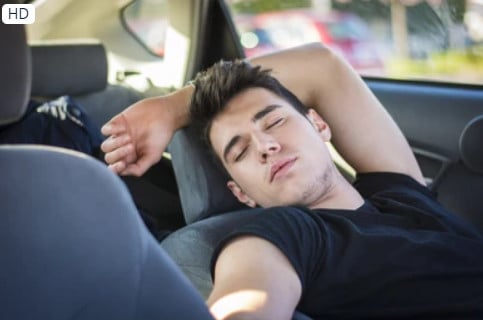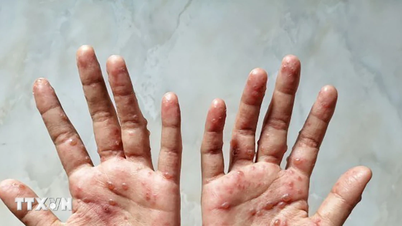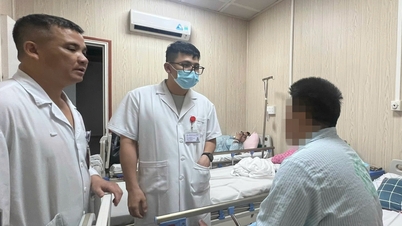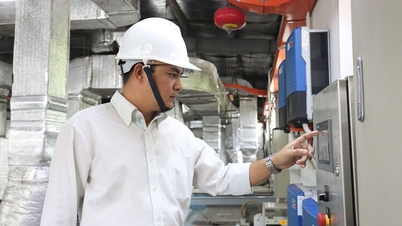However, as one expert pointed out, there have been cases of people dying from sleeping in cars with the air conditioning on. So, never do this foolish thing; you could die in less than an hour, according to Gulf News (UAE).

At first glance, with the air conditioning on and the music playing, the car seems like an ideal place to take a nap.
Dr. Babu Shershad from the First Medical Centre (Dubai, UAE) will explain this in detail.
1. Why can sleeping in a car with the air conditioner on cause suffocation?
If the mechanical functions of a car are not up to standard, the possibility of exhaust fumes leaking into the vehicle while sleeping can increase the risk of suffocation because it will reduce the oxygen level inside the car.
However, the main thing to note is that the buildup of carbon monoxide (CO) can be due to leaks from the exhaust pipe.
Carbon monoxide (CO) is toxic to the blood, and increased CO levels in a vehicle can actually reduce the amount of oxygen in the blood, as CO binds to red blood cells and takes the place of oxygen.
This results in the blood carrying more CO, and a lack of oxygen causing suffocation, ultimately leading to shock or, in severe cases, death.
Even in a car with a well-functioning air conditioning system, air circulation in a small space can be affected. Even with air circulating in and out of the vehicle, it may still not be enough for a person to breathe in a confined space, according to Gulf News.
Is it safe to roll down the car windows?
Another common misconception among many people is that rolling down the car windows will provide adequate ventilation in the car. Dr Shershad said: Even with the windows rolled down, carbon monoxide still accumulates at lower levels, which over time can reduce the amount of oxygen in the blood and cause the sleeper to lose water and body fluids, according to Gulf News.
Why can I stay awake in the car but not sleep?
The answer is that if you were awake, you would feel asphyxiation and take action. But when you are asleep, you will have a harder time recognizing the symptoms of CO poisoning.
Doctors advise drivers to only sleep in their cars in emergencies and to always take short breaks outside the vehicle when driving for extended periods.
2. How can I tell if I've been poisoned by carbon monoxide?
Signs and symptoms of carbon monoxide poisoning may include: headache, nausea, dizziness, vomiting, chest pain, shortness of breath, confusion, seizures, and coma, according to Says (Malaysia), citing sources from the Malaysian Ministry of Health .
The longer the gas is inhaled, the more severe the symptoms will be.
Furthermore, loss of consciousness can occur briefly if there is a lot of CO in the air.
A level-headed person can recognize these symptoms and take immediate action.
However, the danger of sleeping in a car is that the sleeper can die in his sleep from CO poisoning without showing any symptoms.
3. What can be done to prevent CO poisoning?
Because CO gas cannot be seen or smelled, it is best to avoid exposure in the first place.

Carbon monoxide (CO) binds to red blood cells and displaces oxygen, reducing the amount of oxygen in the blood.
To protect yourself from carbon monoxide poisoning, you should:
- Regularly inspect and monitor your car's exhaust system. Leaks in the exhaust system can allow carbon monoxide (CO) to enter the vehicle.
- Always have your car repaired, even after a minor accident. Any damage or holes in your car can allow more smoke to enter the car.
Never start a parked car in an enclosed area. Even with the windows or garage door open, carbon monoxide (CO) can reach dangerous levels inside the vehicle.
- Installing a CO detector in your car is the safest way.
Last and most importantly, of course, don't sleep in a car with the engine running and the air conditioning on, says Says.
Source link




![[Photo] Explore the US Navy's USS Robert Smalls warship](/_next/image?url=https%3A%2F%2Fvphoto.vietnam.vn%2Fthumb%2F1200x675%2Fvietnam%2Fresource%2FIMAGE%2F2025%2F12%2F10%2F1765341533272_11212121-8303-jpg.webp&w=3840&q=75)





































































































Comment (0)